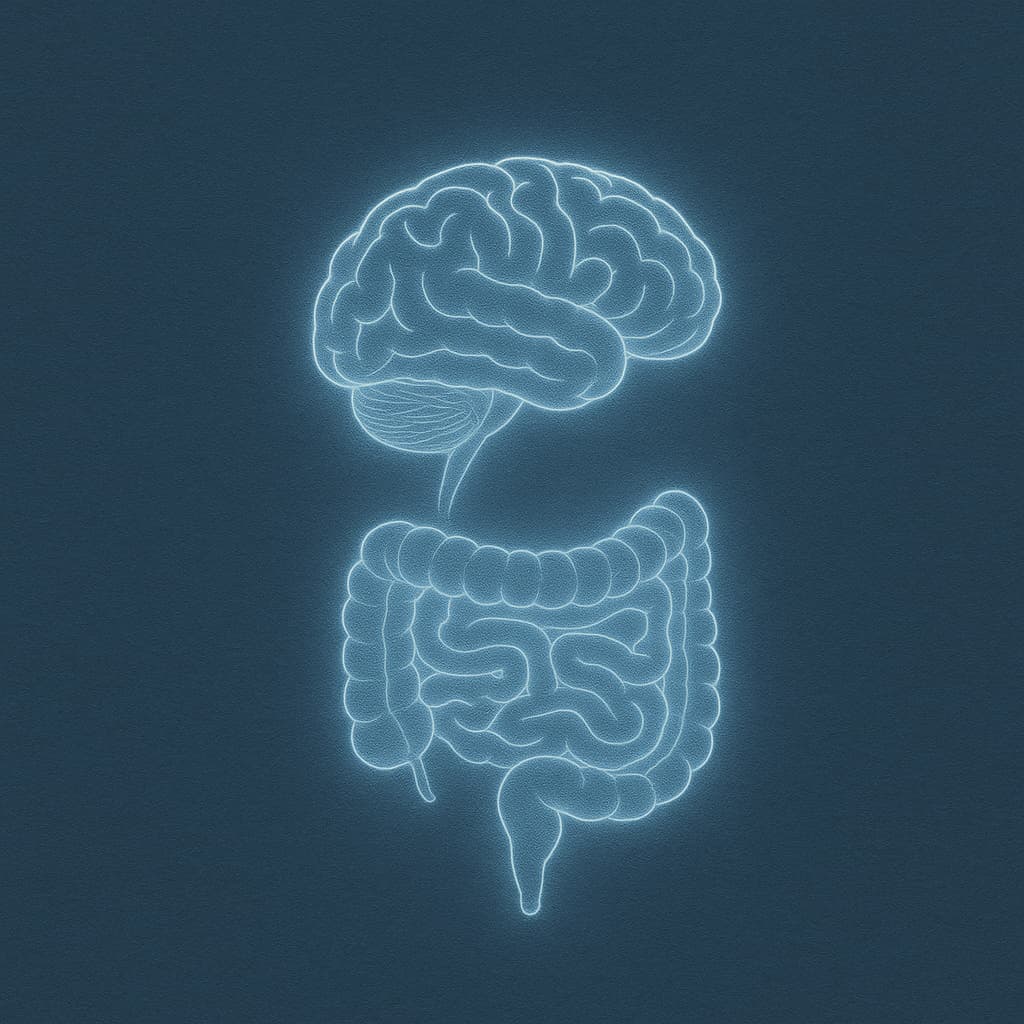Ever notice that nights after a heavy meal or a stressful day feel restless, no matter how tired you are? It’s not just coincidence. Scientists are discovering that your gut health and sleep are deeply connected — and that the bacteria living in your intestines may play a bigger role in your rest than your bedroom temperature or bedtime routine.
Inside your digestive system lives a bustling community called the gut microbiome, which influences everything from mood to metabolism. What’s fascinating is that these microbes also help produce key sleep-related hormones like serotonin and melatonin — the very chemicals that regulate when you feel sleepy or alert.
When your gut is balanced, your body’s internal rhythm flows smoothly. But when it’s out of sync, you might experience fragmented sleep, low energy, or that frustrating 3 a.m. wake-up.
In this article, we’ll explore how your gut communicates with your brain, why imbalances can disrupt deep sleep, and what practical steps you can take — through food, habits, and stress relief — to restore both your digestion and your rest.
The Gut–Brain Axis: How Your Microbiome Talks to Your Sleep Center

Think of your gut as a second brain — literally. It communicates with your central nervous system through the vagus nerve, sending chemical messages that affect mood, stress, and sleep.
About 90% of your serotonin, the hormone that lifts mood and helps set your sleep–wake rhythm, is produced in the gut. Serotonin later converts to melatonin, which signals your body that it’s time to wind down for the night.
When your gut microbiome is healthy and diverse, these messages flow smoothly, helping you fall asleep more easily and cycle naturally through deep and REM stages. But an unbalanced gut — often caused by stress, poor diet, or antibiotics — can interfere with serotonin production and trigger inflammation that keeps your brain on alert when it should be resting.
A Balanced Gut Supports a Balanced Rhythm
Supporting your microbiome isn’t complicated. It starts with small, consistent habits — eating more fiber-rich foods, limiting processed sugars, and keeping meal times regular. These choices nurture beneficial bacteria that, in turn, help your brain produce the right balance of sleep hormones.
Pro tip: Think of every meal as a chance to “train” your gut for better sleep. Even one serving of fermented food or prebiotic fiber a day can begin to restore harmony between your digestion and your circadian rhythm.
When Gut Imbalances Disrupt Your Sleep

When your gut is healthy, it’s home to a rich mix of bacteria that support digestion, immune function, and hormone balance. But when that balance tips — a state called dysbiosis — it can quietly ripple through your whole system, even affecting how well you sleep.
An imbalanced gut often triggers low-grade inflammation, which raises the stress hormone cortisol and reduces the body’s ability to release melatonin at night. That hormonal confusion can leave you feeling wired when you should be winding down — or waking up in the middle of the night unable to fall back asleep.
Poor diet, chronic stress, antibiotics, alcohol, and irregular sleep hours can all contribute. Over time, your gut and brain stop “communicating” clearly through the vagus nerve, sending mixed signals that make it harder for your body to relax and recover.
Research even shows that people with lower microbiome diversity often experience lighter, more fragmented sleep and wake more frequently during the night.
You don’t need a lab test to tell when your gut might be out of sync. The signs often show up in both digestion and energy patterns:
- Bloating, indigestion, or discomfort after meals — especially at night
- Waking up between 2–4 a.m. and struggling to fall back asleep
- Fatigue or brain fog, even after what seems like a full night’s sleep
- Mood swings, anxiety, or sugar cravings that spike when you’re overtired
If several of these sound familiar, your gut might be asking for attention. Traditional sleep fixes — darker rooms, magnesium, or meditation — can help, but they often work best once your gut health is stable.
So think of your gut as part of your sleep routine, not separate from it. Restoring balance through food, hydration, and stress management doesn’t just ease digestion — it also helps your brain reestablish a healthy sleep–wake rhythm.
Everyday Habits to Strengthen Gut Health and Improve Sleep

The good news is that improving your gut health doesn’t require a major overhaul. It’s about creating small, consistent habits that keep your digestion calm and your circadian rhythm steady. When your gut feels balanced, your sleep tends to follow.
Nourish Your Microbiome Through Food
Your gut bacteria thrive on what you feed them. To keep that community diverse and healthy:
- Add prebiotic foods like garlic, onions, oats, bananas, and asparagus — these feed the good bacteria that produce calming compounds for your nervous system.
- Include probiotic foods such as yogurt, kefir, sauerkraut, kimchi, or miso — all of which help restore balance after stress or antibiotic use.
- Limit gut irritants like processed foods, excess sugar, alcohol, and artificial sweeteners. They can reduce healthy bacteria and cause inflammation that interferes with sleep hormones.
If your diet is limited or you’re recovering from illness, consider a high-quality probiotic supplement containing Lactobacillus and Bifidobacterium strains. These are the same beneficial microbes linked to better mood and sleep regulation.
For more ideas on foods that naturally boost serotonin and melatonin, check out our full list of the best foods for sleep
Pro tip: Think color. A plate filled with fruits, vegetables, and fermented foods is your microbiome’s version of a weighted blanket — comforting and supportive.
Eat in Sync With Your Body’s Rhythm
our gut and your internal clock work together. When you eat at unpredictable times, it confuses both digestion and sleep hormones.
- Try to eat dinner at roughly the same time each evening, ideally two to three hours before bed.
- Avoid heavy, late-night meals that force your digestive system to stay active while your brain is trying to rest.
- Enjoy a calming herbal tea such as chamomile, peppermint, or ginger to soothe digestion and signal to your body that the day is winding down.
- Keeping your eating schedule consistent helps regulate melatonin production, so your body knows exactly when it’s time to power down.
Related Posts:
- 7 Calming Herbal Teas That Help You Sleep Better and Ease Stress
- 10 Easy Sleep-Boosting Recipes for a Restful Night
Manage Stress to Calm the Gut–Mind Connection
Stress is one of the fastest ways to upset the microbiome and disrupt sleep. Elevated cortisol alters gut motility and bacterial balance — a reason many people experience both anxiety and indigestion before bed.
To quiet the stress–gut loop:
- Practice slow breathing or a few minutes of mindful stretching after dinner.
- Take a short evening walk to aid digestion and signal your body that bedtime is near.
- Reduce screen time an hour before sleep — blue light and late-night scrolling keep cortisol high and melatonin low.
Even small rituals, repeated nightly, help your nervous system unwind — and your gut bacteria respond positively to that sense of calm.
You may also like:
- Calming Breathing Exercises to Help You Sleep Better Tonight
- Meditation for Sleep: A Simple Step-by-Step Guide
The Sleep Benefits of a Balanced Gut

When your gut finds its rhythm again, you’ll start to notice the difference — not just in digestion, but in the way you sleep, wake, and move through your day. That’s because a balanced gut microbiome quietly restores balance throughout your body: hormones stabilize, inflammation subsides, and your brain receives the clear signals it needs to rest.
You Fall Asleep More Easily
A healthy gut helps your body produce steady levels of serotonin and melatonin, two key hormones that guide your sleep–wake cycle. Instead of tossing and turning, you may find yourself drifting off more naturally, often within minutes of lying down.
Many people notice that once their digestion settles — fewer late-night stomach rumbles or discomfort — their mind also feels calmer, making it easier to transition into rest mode.
You Stay Asleep Longer
Poor gut balance can fragment your sleep, causing early-morning awakenings or light, shallow rest. As your microbiome diversity improves, your REM and deep sleep stages tend to lengthen. This is when your body does its most important repair work — rebuilding tissues, balancing hormones, and consolidating memory.
That’s why after a week or two of consistent gut-friendly habits, you might start waking up with a steadier mood and more morning energy, even without extra hours of sleep.
You Wake Up Refreshed, Not Groggy
When the gut and brain communicate clearly, cortisol and melatonin stay in sync. This means melatonin levels drop naturally in the morning while cortisol rises to give you energy — instead of feeling foggy or needing multiple cups of coffee to get going.
You might also notice less mid-afternoon fatigue, better focus, and a generally lighter feeling in your body throughout the day.
You Feel More Balanced Overall
Good gut health doesn’t just improve sleep; it supports mood, stress resilience, and immune strength. Many people describe feeling “lighter” — both mentally and physically — once inflammation eases and their sleep stabilizes.
Learn more about the connection between your immune system and sleep
Simple truth: when your gut thrives, your whole system thrives.
Better digestion leads to better sleep, and better sleep reinforces a healthier gut — a positive loop your body was designed to maintain all along.
Bottom Line
Your gut and your sleep are in constant conversation — one influences the other more than most people realize. When your digestion feels off, your nights often follow. But when you start nourishing your microbiome, balancing your meals, and easing daily stress, your body begins to restore its natural rhythm.
It doesn’t happen overnight, but within a few weeks of consistent care — lighter dinners, more fiber, mindful moments before bed — you’ll likely feel the shift: falling asleep faster, sleeping more deeply, and waking up clear-headed instead of drained.
FAQs About Gut Health and Sleep
Can bad gut health affect sleep?
Yes. Poor gut health can disrupt the balance of bacteria that help produce serotonin and melatonin—two hormones essential for quality sleep. Inflammation or imbalance in the gut can also raise stress hormones, leading to restless nights or frequent waking. Supporting your gut helps your body relax and sleep more deeply.
Can poor digestion cause trouble sleeping?
Yes. Indigestion, bloating, or acid reflux can keep your body alert and make it hard to relax at night. Eating smaller, lighter dinners and avoiding food close to bedtime can ease strain on your digestive system, supporting both gut comfort and better sleep quality.
Do probiotics help you sleep better?
Certain probiotic strains—especially Lactobacillus and Bifidobacterium—support gut health and sleep by promoting serotonin production and reducing inflammation. Regular use of probiotic foods or supplements can improve digestion, calm the nervous system, and make it easier to fall and stay asleep naturally.
What happens to your gut when you sleep?
During sleep, your gut enters repair mode. It digests remaining food, restores the gut lining, and rebalances beneficial bacteria. Poor sleep interrupts these processes, while steady rest allows your microbiome to function optimally—supporting digestion, mood, and overall health.
What is the 7-day gut reset?
A 7-day gut reset is a short program designed to reduce inflammation and rebalance your microbiome. It usually includes eating whole foods, adding prebiotics and probiotics, cutting out processed sugars, and staying hydrated. While it’s a good start, lasting gut and sleep improvements come from consistent, long-term habits.

